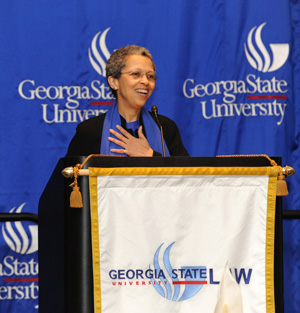Integration of cognitive, ethical and practical in legal education focus of 44th Miller Lecture
ATLANTA—The need for law schools to improve legal education by integrating cognitive, ethical and practical apprenticeships was the focus of Georgia State University College of Law's 44th Henry J. Miller Distinguished Lecture presented by Peggy Cooper Davis, the John S.R. Shad Professor of Lawyering and Ethics at New York University School of Law. 
“I accept wholeheartedly the Carnegie (Foundation's) criticism that legal education woefully neglects the practical and the ethical,” Davis said in her March 26 lecture. “We segregate the cognitive from the practical and ethical for a variety of good and bad reasons. I've often made the feminist argument that one of the reasons is that cultural and psychological biases incline us to ghettoize practical and ethical work and to privilege what we think of as cognitive work.”
Davis, who says students can't fully learn how to become a professional by sitting and debating in a classroom, has often said that law schools focus too narrowly on the skill of analyzing logically, and to some extent in terms of policy, the opinions of appellate courts.
NYU's Lawyering Program, which Davis has directed since 1999, uses simulated exercises to encourage future lawyers to approach legal problems by planning, executing, and critically reflecting on the consequences of choices they make. By the end of their first year law school students can execute legal strategies by drafting documents, interview witnesses and clients and engage in negotiation, mediation and litigation.
“Langdellian teachers, like Christopher Columbus Langdell, continue to put and make a point of putting students in role,” Davis said. “We ask questions to do cognitive work towards hypothetical but very practical ends and we challenge them to do it responsibly and mindfully of the ethical apprenticeship. We've also developed new teaching methods that build on the experiential learning theory.”
Davis, who admits that she did not feel adequately prepared after law school graduation, drew from her experiences as a student, judge and teacher to explain her unique perspective of why law schools should desegregate legal education. Davis, who joined the NYU law faculty in 1983, served three years as a judge of the Family Court of the State of New York and 10 years practicing law.
“We must take care not to segregate that which we have neglected because segregation perpetuates misunderstanding and facilitates further neglect,” Davis said. “My argument is that we can not respond adequately to the Carnegie critique by simply taking care that we have Socratic method and seminar courses, simulations and clinic courses, and courses in professional responsibility, all under the same roof or on the same campus. We don't just need to put the three apprenticeships together. We need to undo the effects of their segregation.”
Steven Kaminshine, dean of the College of Law, said that he was proud of Georgia State's law faculty who are active players in the national dialogue to revolutionize legal education.
“The way we prepare students to enter the legal profession, really hasn't changed that much over a century,” Kaminshine said. “So the fact that today many law schools across the country are engaged in animated conversations and intense introspections about they way we teach and about the way law school students learn, represents an important moment and an important opportunity for law schools to seriously think about doing things differently and better. There have been calls for change before, but I suspect not this loudly, and arguably not with this much momentum behind us.”